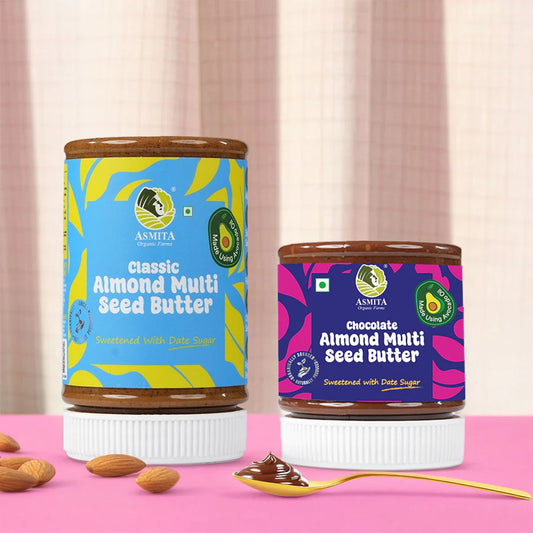Almond Butter Nutrition and Calories: The Truth About 1 Tablespoon
Info Organic 5 min readMove over, peanut butter—there’s a new favourite in town! Almond butter is stealing hearts (and shelves) in health-conscious kitchens everywhere. With its irresistibly rich and creamy texture, it’s not just a treat for your taste buds but also a powerhouse of nutrition. Healthier than many traditional options and even other nutty competitors, almond butter is here to make snack time way more delicious—and guilt-free!
Whether spread on toast, blended into smoothies, or added to baking, almond butter packs a punch of nutrients. But how much does 1 tablespoon really contribute to your daily intake? Let’s explore the almond butter nutrition and calories to uncover its true value.
Table of Contents
- Nutrition Value of Almond Butter
- Calories in Almond Butter
- Is Almond Butter Healthier than Peanut Butter?
- Monounsaturated Fats and Almond Butter
- How to Find the Nutrition-Rich Almond Butter in India
- Bottom Line
- Frequently Asked Questions
Nutrition Value of Almond Butter

Made from finely ground nuts, almond butter is an excellent source of vitamins, minerals, protein, and healthy fats.
It's a versatile superfood that fits effortlessly into a variety of diets, from fitness enthusiasts seeking protein to those prioritising heart-healthy fats.
Beyond its nutty flavour, almond butter boasts an impressive array of nutrients. A typical serving of 1 tablespoon (about 16g) contains the following almond butter nutrition facts:
- Calories: 98
- Protein: 3.4 g
- Fats: 8.9 g
- Carbs: 3 g
- Fiber: 1.7 g
- Sugars: 1 g
- Vitamin E: 3.87 mg (22% of the daily value)
- Magnesium: 44.6 mg (12% of the daily value)
- Calcium: 55.5 mg
- Iron: 0.6 mg
- Riboflavin: 0.2mg
Evidently, almond butter is a powerhouse of nutrition, especially rich in healthy fats, particularly monounsaturated fats. These fats play a crucial role in reducing bad cholesterol levels, supporting heart health, and providing sustained energy.
Its protein content helps in muscle repair and maintenance, making it a great post-workout snack or a midday energy booster. The almond butter nutrition value comprises a small amount of carbs and offers a good dose of dietary fiber, helping you stay full longer and aiding digestion.
Beyond macronutrients, almond butter shines with its micronutrient profile. It’s an excellent source of vitamin E, an antioxidant that protects cells from damage and supports skin health.
The magnesium content promotes nerve and muscle function, while calcium and iron contribute to bone strength and oxygen transportation in the body. This combination makes almond butter not only a delicious addition to meals but also a nutrient-packed choice for improving overall health.
Calories in Almond Butter
When you’re watching your calorie intake, you might wonder how almond butter calories measure up. At 98 calories per tablespoon, it’s a moderate-calorie addition to your diet.
Since it’s nutrient-dense, each spoonful provides a wealth of benefits, making it a smart choice for those seeking both flavour and nutrition. While almond butter is calorie-dense due to its healthy fat content, it’s also highly satiating.
The combination of protein, fiber, and fats slows digestion, helping you feel full longer and reducing the urge to snack unnecessarily. This makes almond butter a fantastic option for weight management when consumed in moderation. Whether you spread it on whole-grain toast, pair it with fruit, or add it to oatmeal, almond butter offers a perfect balance of calories and nutrients to fuel your day without going overboard.
Is Almond Butter Healthier than Peanut Butter?

A common question that arises when discussing nut butters is whether almond butter is healthier than peanut butter. The short answer depends on your nutritional goals, but overall, almond butter tends to be the better choice for most people, particularly for those prioritising heart health and a nutrient-rich diet.
Here’s a comparison of the key nutrients in almond butter vs peanut butter per tablespoon:
Nutrient |
Almond Butter (per tbsp) |
Peanut Butter (per tbsp) |
|
Calories |
98 |
96 |
|
Protein |
3.4 g |
3.6 g |
|
Fat |
8.9 g |
8.2 g |
|
Magnesium |
44.6 mg |
26.9 mg |
|
Iron |
0.6 mg |
0.3 mg |
|
Vitamins |
3.87 mg |
1.5 mg |
|
Riboflavin |
0.2 mg |
0 mg |
|
Calcium |
55.5 mg |
7.9 mg |
|
Carbs |
3 g |
3.6 g |
|
Fiber |
1.7 g |
1 g |
|
Sugar |
1 g |
1.7 g |
Calories
Both almond butter and peanut butter contain roughly the same number of calories per tablespoon, but almond butter tends to have slightly fewer sugars and a better overall nutrient profile, including higher levels of healthy fats, vitamins, and minerals.
Protein
Peanut butter has a slight edge in protein content, offering 3.6g per tablespoon compared to almond butter’s 3.4g. While the difference is small, peanut butter’s protein may be appealing for those looking to increase protein intake.
Fat Content
Almond butter is higher in monounsaturated fats, the healthy fats that help reduce bad cholesterol levels. Peanut butter, on the other hand, contains more polyunsaturated fats and can sometimes have added sugars and hydrogenated oils (in conventional brands).
Carbs, Fiber, and Sugar
While peanut butter has slightly more carbs (3.6g vs 3g in almond butter), almond butter provides more fiber (1.7g compared to 1g). Fiber helps improve digestion and stabilise blood sugar levels. Additionally, almond butter has less sugar, with just 1g per tablespoon, compared to peanut butter’s 1.7g, making it a better choice for those watching their sugar intake.
Vitamins and Minerals
This is where almond butter truly shines:
Vitamin E:
Almond butter contains nearly 3.87mg of vitamin E per tablespoon, significantly higher than peanut butter’s 1.5mg. Vitamin E is a powerful antioxidant that supports skin health and immune function.
Magnesium:
Almond butter offers 44.6mg, almost double the 26.9mg in peanut butter. Magnesium is essential for muscle function, nerve health, and bone strength.
Calcium:
Almond butter boasts 55.5mg of calcium per tablespoon, compared to peanut butter’s 7.9mg, making it a better option for bone health.
So, if you’re looking for a spread that supports heart health and offers more beneficial nutrients, almond butter is the winner.
Monounsaturated Fats and Almond Butter

One of the key components that makes almond butter so good for you is its high concentration of monounsaturated fats. These healthy fats are well-known for their ability to:
- Reduce the risk of heart disease
- Improve cholesterol levels
- Promote healthy skin
According to the American Heart Association, when eaten in moderation, monounsaturated fats—like those found in almond butter—can have positive health benefits and play a key role in maintaining a heart-healthy diet. These fats can help reduce bad cholesterol levels, thereby lowering the risk of heart disease and stroke.
A tablespoon of almond butter contains about 5g of monounsaturated fats, which makes it an excellent choice for anyone looking to increase their intake of healthy fats. These fats play a crucial role in improving overall health and supporting energy levels throughout the day.
How to Find the Nutrition-Rich Almond Butter in India

When looking for the best almond butter in India, it’s important to check the almond butter nutrition information on the label.
Many commercial brands may add refined sugar, preservatives, and unhealthy oils to their products, which can reduce the health benefits.
To ensure you’re getting the best quality almond butter, look for:
Organic almond butter:
Ensure no pesticides, additives, artificial colours or chemicals are used in production. Choose almond butter products that are made from premium quality almonds, like California-grown almonds, for the best taste and nutrition.
No added sugar:
Choose products naturally sweetened with alternatives like dates for a rich, caramel-like flavour without the sugar spike.
No hydrogenated oils:
With avocado oil (and not palm oil) as a base, ensure a heart-healthy option. Other great choices include olive oil and coconut oil.
Vegan & dairy-free:
Fitting into any lifestyle, whether you’re avoiding animal products or looking for a sustainable, cruelty-free snack.
Mixed with multiseeds:
For even more nutritional value, almond butter mixed with a variety of seeds (chia, sunflower, pumpkin, and flax seeds) is a fantastic choice. This combination enhances the health benefits while adding a delicious crunch to your spread.
In India, several premium brands offer organic and nutrition-rich almond butter, so you can enjoy the many benefits of almond butter without compromising on quality.
Bottom Line

If you’re looking for a tasty and wholesome way to power up your day, almond butter is here to save the day! Packed with healthy fats, protein, and a variety of essential vitamins and minerals, it’s the perfect way to fuel your body. With its low sugar content and heart-healthy monounsaturated fats, almond butter is a standout choice for boosting your energy, supporting muscle function, and adding a deliciously nutritious twist to your meals.
Ready to experience the wholesome goodness of almond butter? At AsmitA Organic Farms, we offer Almond Multiseed Nut Butter, protein-packed, made with nutrient-rich avocado oil, and free from added sugars. Whether you're swapping out peanut butter or adding a nutritious boost to your recipes, our almond butter is the perfect choice.
Place your order today and enjoy a nourishing selection crafted from the finest natural ingredients. Start your day with a spoonful of goodness with our Almond Multiseed Butter!
Frequently Asked Questions
1. Is almond butter better than peanut butter?
Almond butter is generally considered healthier due to its higher content of monounsaturated fats, vitamin E, and magnesium. However, both are nutritious options, and you can choose it based on your dietary needs.
2. How many calories are in a tablespoon of almond butter?
A tablespoon of almond butter contains approximately 98 calories. This makes it a great energy-boosting spread without being overly caloric—perfect for a balanced diet when consumed in moderation.
3. What is the fat content of almond butter?
A tablespoon of almond butter contains 8.9g of fats, including 6.2g of healthy monounsaturated fats. This healthy fat is known for its ability to lower bad cholesterol and reduce the risk of heart disease.
4. Does almond butter have any sugar?
Pure almond butter has a small amount of sugar (approximately 1g per tablespoon). This sugar comes from the almonds themselves and does not have the same effect on your blood sugar as refined sugars.
5. Can I use almond butter in cooking or baking?
Yes, almond butter is a versatile ingredient and can be used in smoothies, baking, or as a spread on toast or in salad dressings. It adds a rich, nutty flavour and a creamy texture, making it perfect for both savoury and sweet dishes.
6. How do I store almond butter?
Store almond butter in a cool, dry place. If it separates, simply stir before use. Refrigeration is optional but can help extend its shelf life.
Add
Disclaimer: The nutritional values provided here are based on standard products and may vary between different brands or types of almond butter. Always check the product label for specific information.




